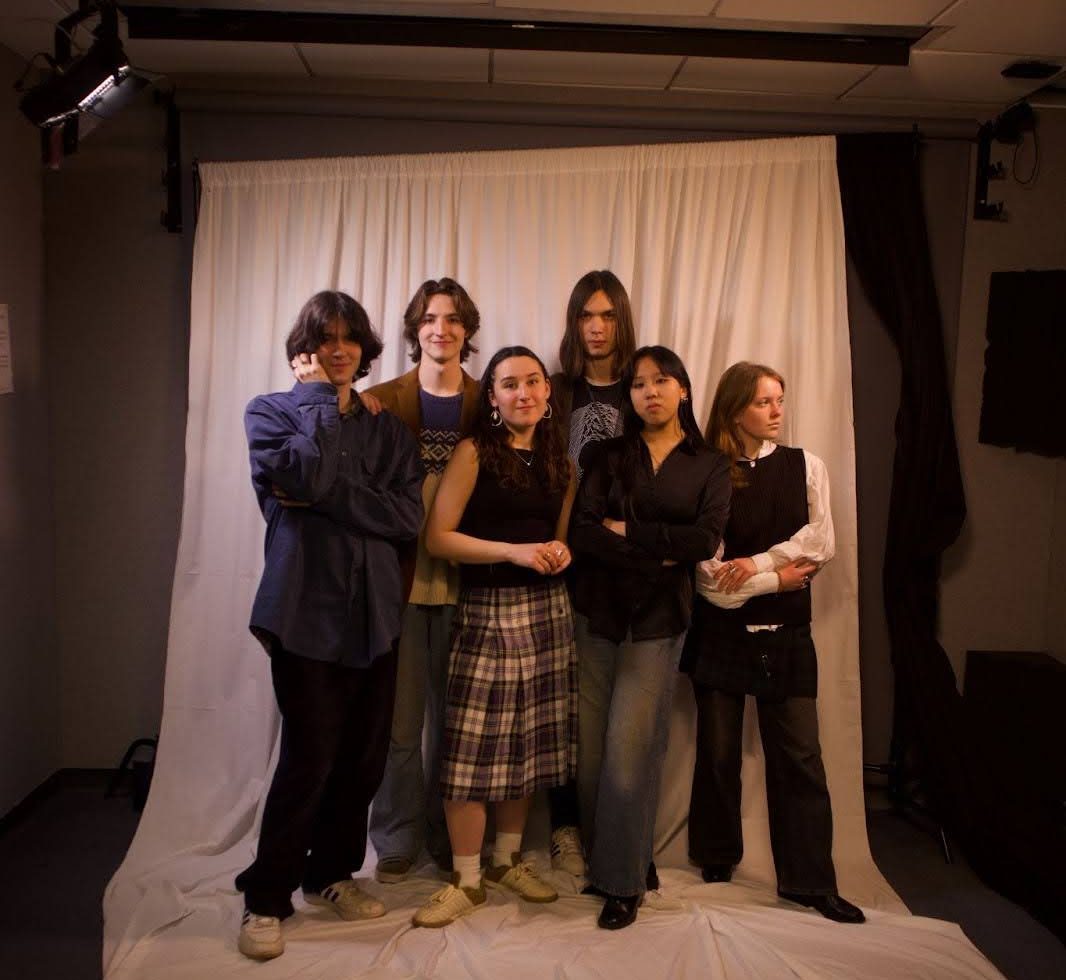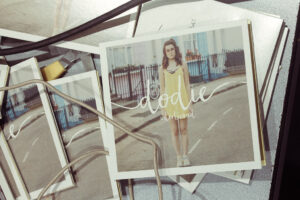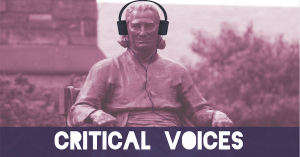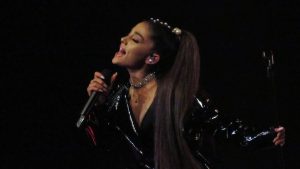When Daisy Casemore (COL ’26) stepped onto campus this past fall, she knew her time here was limited. After a year abroad at Georgetown, she would be sent back home to the University of Edinburgh, so, with the clock ticking, she sprung into action with one goal in mind: music.
In Edinburgh, Casemore plays in a different band, Springhouse, and wanted to continue her songwriting and music-making in the states. During the fall semester, she went solo, but realized it was never as fun as playing with other people. What happened next was very organic; through mutual friends, parties, and musical events like Battle of the Bands, co-hosted by WGTB, Georgetown’s radio, and the Georgetown Program Board, Casemore collected the other members of her new group: Wonk.
Wonk is a 6-piece student band, giving the world music that is self-described as “experimental art rock” or “crescendo chamber pop,” thanks to the efforts of Casemore, who is the group’s guitarist and vocalist, pianist Griffin Elliott (COL ’26), bassist Manya (SFS ’26), violinist Christina Pan (COL ’27), drummer David Patnaude (SON ’28), and clarinet player Elliot Anderson (COL ’28), as well as—of course—the occasional melodica from assorted members.
On Feb. 15, Wonk is set to perform in Bulldog Alley at a benefit concert headlined by D.C.-based “shoe-gays” band Pinky Lemon and supported by other student groups Baltimore Avenue and Sense Memory. All profits from concert tickets will be donated to Medical Aid for Palestine (MAP). In light of their first official performance as a band, the Voice took this opportunity to learn more about the eclectic amalgamation of artists.
This interview has been edited for length and clarity.
Where does the name “Wonk” come from?
Anderson: We were like, this is a band, we’re doing something. So [Daisy was] like, if we’re going to do something, we need a name, and [she] wanted something really short.
Casemore: Yeah, I wanted it to be one word.
Anderson: You initially suggested Duck. And then you were like, “wait, that’s just [the rock band] Geese.”
Casemore: Duck is so cute though.
Anderson: And so I threw out a few things. I eventually threw out Wonk because a few days before it was a word on the NYT mini.
Casemore: We’re intellectuals.
Anderson: It’s so random.
Patnaude: Erm, random much?
What does the word wonk mean to you?
Pan: I don’t know. I couldn’t tell you. I think that W is a really good letter, it’s like: W.
Casemore: I quite like how it’s a malleable word. It doesn’t have an attached meaning or feeling or emotion to it. And it’s fun. A lot of what we’re doing is fun.
Patnaude: It’s like a fix.
Elliott: I like that it feels abstract. I actually didn’t know it had a real definition. I think of it like the noun form of wonky, in the way that you might say fance. If someone is fancy, they have fance.
Anderson: I just think of it like a random collage of noise.
Which artists most influence your music?
Anderson: Black Country, New Road.
Casemore: I also think, vocally, I have taken a lot from Slow Pulp’s lead singer. I love her vocal style. And I also like Joni Mitchell’s flexibility about the scale. Her vocal flips, too, is something I realized I could do, like incorporating that. Also, since I have been listening to a bit more rock-y stuff like Wunderhouse or Truth Club, or even Fontaines, it’s kinda liberating to be doing a lot of shouting and speaking rather than just pretty singing.
Patnaude: I feel like I play exactly like Ringo.
Anderson: Something that makes us so unique is that we all come from different musical backgrounds. Christina is all classical. I’ve got a range of different things like rock, but also stuff I’ve played in musicals or marching bands. Griffin, you have a lot more singer-songwriter in you than like the stuff me or Daisy or David listens too. And then David of course—
Casemore: Jazz.
Anderson: Something in all of our songs is that we each take a different inspiration. I’ll often be like, I want this part to be like this artist and this other part to be like this artist. And then David’s part—
Patnaude: It’s perfect every time, I never mess up.
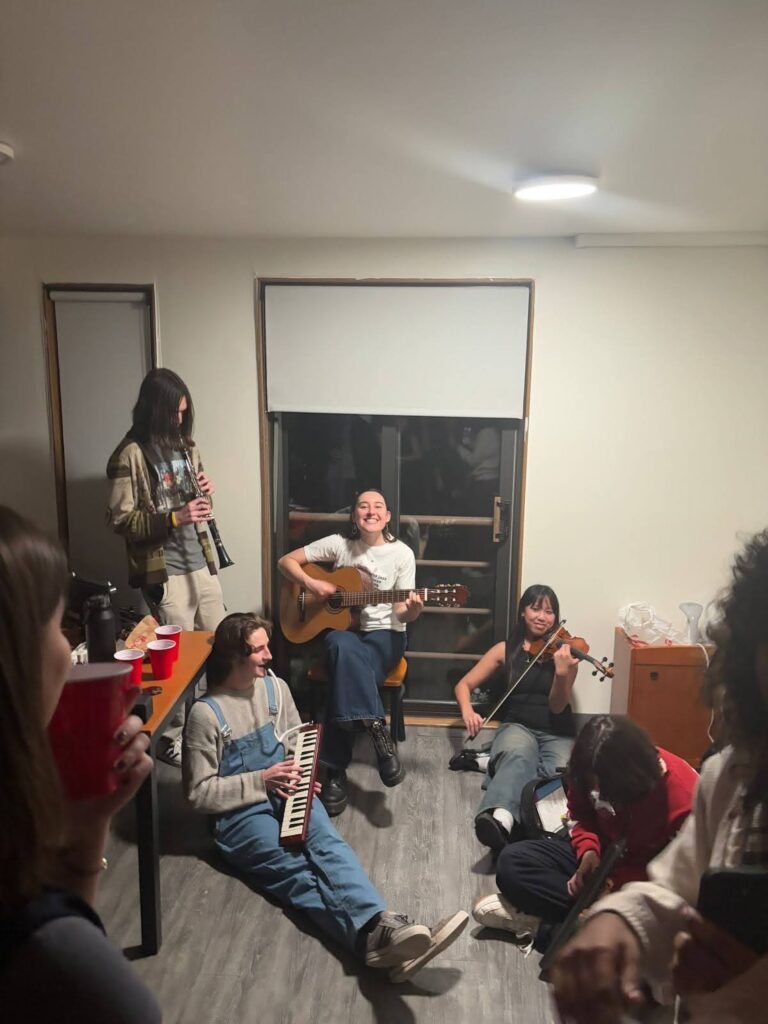
Photo by Nancy Britten Wonk preforming impromptu at Patnaude’s birthday party.Photo by Nancy Britten
What has been your proudest moment as a band?
Patnaude: Playing at my birthday party.
Elliott: I was actually going to say that. We had songs and the heart of Wonk was beating strong that night.
Anderson: We just became like a house band. Griffin was on melodica, I was on guitar—
Patnaude: I was also on melodica.
Anderson: And then like me, Griffin, and Christina were just like playing backing songs and then people would join in and sing to them like a karaoke house band.
What are you most looking forward to as a band?
Patnaude: Making an album or an EP. I want to have a professional recording.
Anderson: I really believe in our songs and our talent and our sound. I feel like if we make recordings that’s eternal.
Elliott: I want something to remember the whole thing.
Casemore: Wonk will inevitably die. But our music will live on forever, as will our legacy.
Patnaude: Wonk will die unless we get really famous, but we have to get really famous. Like Beatles famous.
What does your creative process look like?
Casemore: Typically it’s been, for most of the Wonk songs, I write basic structures, chords, lyrics. Normally my lyrics come from poetry that I write because I find it difficult to sit down and write a song out of the blue, I need to have a preestablished idea there first. Then, I will just mess around on the guitar and see what seems to fit. Then, I’ll come to the rehearsal room, everyone will be there smiling, sitting—
Anderson: “Daisy what song do you have today for us?”
Casemore: And then I’ll play the basic chords or like riffs or anything that I got and then explain my ideas, and then they’ll probably create better ideas than what I originally envisioned. Then Griffin will sometimes say, “That lyric doesn’t work,” and I’ll say, “Thanks Griffin,” and that’s how it’s worked with most of the songs.
Is your collaborative music making effort difficult?
Elliott: The main problem, I have noticed, is that we get musically fatigued. Maybe it’s just me, but I get exhausted from playing something over and over. Like we did that today, we were playing and then we were like, “Can we just play something else?” I think that’s like the main issue. I don’t think there’s creative differences in a way that you hear in a lot of bands. I don’t think we have these big egos clashing against each other that have really strong different opinions. I think that everyone is very much on the same page.
Casemore: One thing in my old band that I learned is that there has to be a sort of creative lead and that wasn’t me in my old band, but I do feel like it is me in this band.
Elliott: It feels like everybody else has almost equally as strong an artistic sense about them, but I feel like this band is for following your artistic vision. It doesn’t mean that we like look to you like “Wow, she has all the talent.” Everybody has their own strong sense of musicality but this group is centered around you.
Casemore: I’m very careful how I give points, because like in my old band stuff that people say can really stick with you. I wouldn’t like to be told how to sing ever, so I am not going to tell anyone how to play.
Patnaude: I feel like that’s something that you do very well. Well, I guess you don’t really give me any pointers because I play everything perfectly but, I feel like you are very respectful with your criticism—if it’s even criticism, it’s more like suggestions. But I also feel like you aren’t very totalitarian and the reason why it doesn’t feel like completely your band that is being driven creatively by you is because we all get to express ourselves with instruments.
Elliott: We improvise so much that like, all the time, at least for me, I’m trying things out on the keyboard. I know that means that sometimes ideas can be good and sometimes they’re not. If I play something, Daisy might just say “play less.”
Anderson: That’s like half the notes. It is just like play less, play more. It’s just like how we fit our collage together.
Casemore: I’m a big believer in less is more. Especially like our songs are very lyric heavy and I want a lot of attention to be drawn to that as well as like, obviously there’s space for big instrumental moments and solos and stuff like that. It’s just about where we want our audience’s point of focus to be.
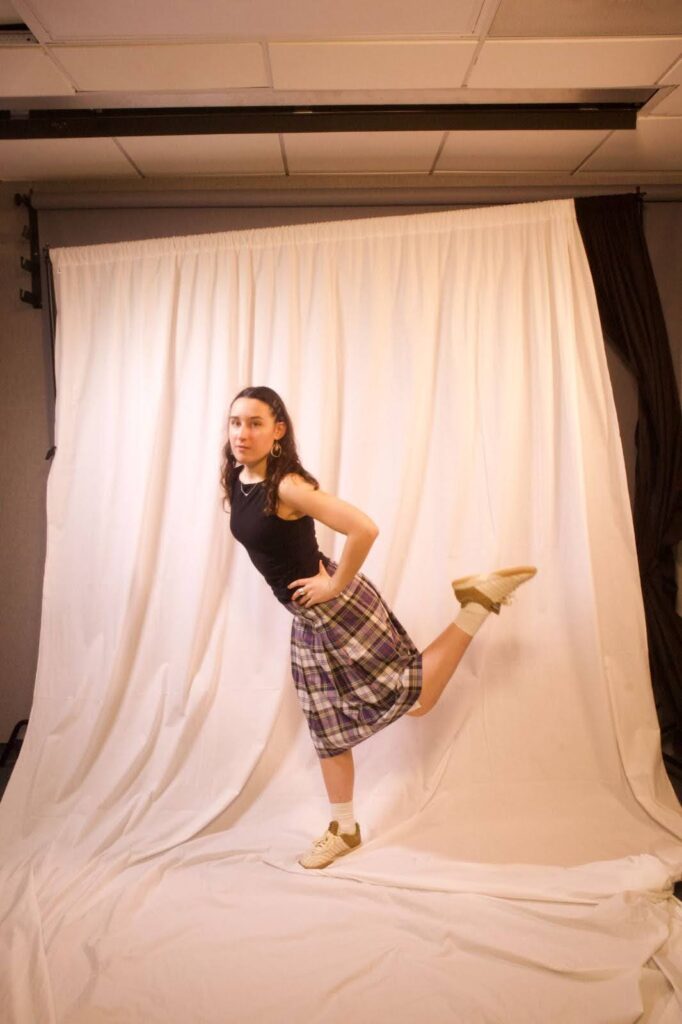
Photo by Elaine Clarke Casemore having fun with poses.Photo by Elaine Clarke
What do you want to say with your music? Or do you just want to have fun?
Patnaude: Fun.
A lot of your lyrics are very abstract. Do you like people to have their own interpretations or are there important messages people should know about each song?
Casemore: Never, never message. Never ever message. It’s always up to however anyone wants to read it. I’m not a dictator. I’m also not a prophet. I do like dropping in a reference from time to time. Like—
Casemore and Anderson: Heavy metal.
Elliott: Wait what’s that a reference to?
Casemore and Anderson: Cameron Winters.
Your song “Silence of Sound,” where does it come from?
Casemore: It comes from being overlooked and not heard from by another person. The poem I originally wrote that expanded into this song came as a response to Pablo Neruda’s 20 poems of love and despair. He has this awful poem about a woman that he just completely objectifies and it just made me really angry. I took a lot of his metaphors and just reworked them.
What do you want to say with it?
Casemore: I don’t know what I want to say. I’m not that critically conscious of myself. I don’t really know what I’m thinking. The part that sticks out to me most is the big crescendo, “Taking up space / Fill it with noise, can you hear me? / You dug me a hole, neat and defined, can you feel me?” That’s a real moment of anger. I don’t ever want any labels put on me ever and I think the space to be transient and undefined is a privilege that this character in the song doesn’t have.
Your song “Media Mogul Superstar,” who is your media mogul superstar? Do you have any inspiration behind the character?
Casemore: My best friend Nancy Britten is big into journalism, and I also took a journalism class last semester and was like “Oh it’s interesting.” Also, thinking about the Georgetown work mindset and how much people are committed to work in America specifically is not something that is translated over in England. This crazy corporate culture is nothing like anything I have ever witnessed.
The song “The Pedestrians” tells a story; what inspired the story?
Elliott: In my notes app, I had the line “There’s two people in this house,” just cause it kind of rung to me. I just liked the image. We kinda built a story around it. It kinda came out kinda organically and we got a little whimsical with it.
Casemore: The short story, “The Pedestrians.”
Elliott: I was also gonna say, there’s a Ray Bradbury story, “The Pedestrians,” which is where it gets its name.
Casemore: We were thinking about the epitome of a neat and tidy and sorta idealized house, dream of domesticity. I had recently listened to the song exploder of Our House, so that was in my subconscious. So we looked at the lyrics [of the song] and wanted to use everything. [The lyric] “was done” had something ominous behind it and that was what we were going for. So we took it and sort of wonked it up a bit. The line in Wonk is “is done, is done, is done,” so there’s a sort of glitch to it.
On the 15th of February, Wonk is performing in a benefit concert for Medical Aid for Palestine (MAP)—what inspired it? Why did you organize it?
Casemore: I felt pretty useless last semester not doing anything, or like seeing everything—what was happening in the news—and being like I couldn’t play a part in doing something for it. I have already been a part of a fundraising gig for MAP back in Edinburgh and it was very successful and also fun. And I think it’s important that, although we get the chance and privilege to play music, I don’t think there is space at the moment for us to be making money, especially considering what’s going on. So the fact that all profits are going straight to MAP is something that I am very proud of. And it’s not really a question, it just needed to happen. It would be wrong to be making money at this point.
What is the importance of creative spaces in a competitive place like Georgetown?
Pan: It makes people less robotic. I think a lot of Georgetown students, however high achieving, it is easy to fall into being a robot and doing what you’re supposed to do. I think that creative expression is very free compared to a lot of classes and clubs.
What has been your biggest challenge as a band with the Georgetown environment?
Casemore: Everyone’s really busy. And also, people aren’t coming to Georgetown to do music. People are coming to study foreign service and business and nursing. It’s not a performing arts school. So everyones really busy and everyone is trying to balance everything.
How do you balance it all?
Pan: We don’t.
Casemore: I don’t. I’m really bad about it.
Anderson: I think all of us have to put in a lot of active effort into actually getting it to balance and that requires all of us to be really into it. I think we are, so that’s why it’s really working.
Casemore: On your list of priorities of things to do, the first thing I always want to do is Wonk, and have band practice and play music. So even if I have papers due, this comes before that.
Does Georgetown need to be more welcoming of the arts? How can the university improve?
Casemore: I think student groups on campus do a really great job of creating a musical community and gigs. You know, radio’s great at doing that, Prospect Records are good—they are just getting their feet off the ground. The music ensembles are also good, I just feel like people are so busy. The resources are all there—the practice rooms could definitely be better, there could be more practice rooms—it’s just people are too busy for it.
What are some things you wish you knew about making music before you started?
Patnaude: Have fun. Nobody is expecting you to be an amazing musician, so if you’re doing it just to get better at the instrument, then you’re not going to want to keep getting better.
Any advice for aspiring student musicians?
Anderson: It is never ever too late to learn or pick up an instrument. You can really start wherever too. You can go from piano and take lessons every day. Or you can just say “Alright I’ll pick up a guitar and learn what I want to.” There are no limits to music, as long as you want to.
Anything else you would like to say?
Casemore: Come to our concert on the 15th!


